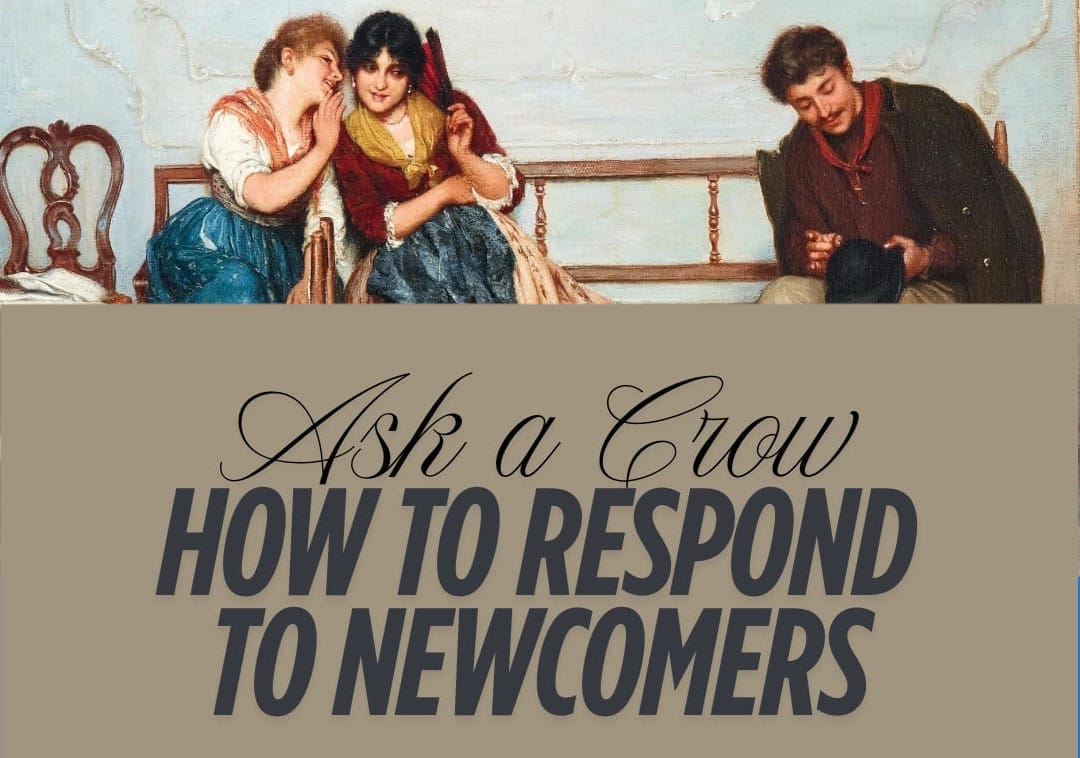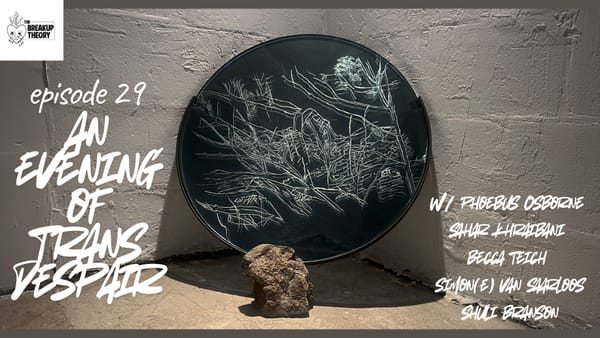ASK A CROW
What do you all do when you are feeling the urgency to connect with more folks but also impatient with the process and time it takes for new people to come in?

Hello crows,
I really try to meet people where they are at, including giving space to the newest person in the room who asks questions like why cops are bad? Or suggest an action that’s unsafe, or a waste of time… but, lately,I am really struggling with this process as so many of our lives are being thrust further into chaos. What do you all do in these moments when you are feeling the urgency to connect with more folks but also impatient with the process and time that takes?
signed,
Banging my head against the wall
Dear Banging,
Sometimes it’s ok to take a break from the process, especially if you are harming yourself by banging your head against a brick wall. In fact, this is an important part of anarchism: evaluating projects and deciding where to put your efforts, whom you want to work with, and how you can support things you don’t necessarily agree with. Some of us have found ourselves working in groups who decide to take different paths than our suggestions, causing us to make a decision about our role moving forward. Sometimes we decide it’s not the group for us and sometimes we decide that despite disagreement we can still support in a way that doesn’t compromise our own ethics. But if you find yourself wanting to block every decision a group makes, then you should definitely find your way out of there. Destroying these groups is doing the work of the state.
To speak directly to the cop question: the last time that happened to one of us, it was during occupy. It became a big process, where meetings were set up to have and to do some training around cops and the state. But at that time, one of us, who often anchored these kinds of processes in community, felt burnt out with this particular question, or more like burnt out with holding the space for this conversation to go well. So, instead of getting upset in front of everyone, they tapped someone else in to do the work. We know you can’t always do that, but it is a valid, care-driven way to cope with the frustrations that will arise. During the Gaza encampments, too, students were often caught in the contradiction of demanding concessions from the authorities (often including desires for punishment), while also autonomously making life together within the structures they built. There is so often a disconnect between what protest movements demand and the actual work being done among ourselves towards mutuality and autonomy. Remaining aware of the distance between what we are actually doing to take care of and defend one another and the reasons we give for coming together can give you a different view: look at what we do rather than what we say.
One of the recurrent situations in the recent decade of uprisings is a new generation of people having the scales fall from their eyes, not theoretically but in the streets. There is no better education in the true aims of the state and empire than the experience of facing off with its enforcers after trying to build better worlds within this hellish one. If you are someone with longtime experience who has already done the work to analyze the true structure of this world, you might find yourself impatient with the newcomers who are just beginning to realize. But another perspective might be delight in their awakening.

We admit it feels disappointing if the best we can hope for in each moment of uprising is another group of people having this awakening, rather than achieving some of the autonomy we fight for. And perhaps this dynamic is why the most radical and militant forces in movements may end up only gaining the reforms and concessions demanded by the liberals and moderates. We make the reforms possible by amping up the threat to the social order, and then the majority gets bought off with scraps that look like success.
A less affirming reading of this dynamic would say it’s the built in cycles of how movements work: folks arrive with new awareness and are stoked to start something with others. Some folks who have been organizing for longer welcome them but many others feel annoyed with the new and often “already been tried” ideas and just want to get things done. These same folks are often burnt out, and often depart. And, while that may be part of the explanation, these cycles also happen due to the way we continue to silo groups of people based on ages. Elders feel unwelcomed or out of the loop of new ideas and ways of being in the world, and most youth ideas are marginalized or pushed aside—especially younger kids, who are often kept out of these spaces based on a societal fear that kids would not be safe and they need to be protected. These kinds of ageist approaches to organising deepens the social borders between us, which only work to cut us off from each other and our potentials to learn new pathways and to do and be more.
If we were to do more things intergenerationally, then fewer folks would show up at ages 18 or 19 ( or at whatever age after becoming aware of the fuckery, or feeling compelled to fight back) less disconnected from the struggles. Most of us are fed heaps of propaganda from state institutions and culture, so it’s no surprise that it can take some folks longer to see the systemic injustices everywhere (especially if they are white and or middle class). For many of us growing up we lack the access or the desire to know the histories of struggles and organizing. If mentorship as an ethos was baked into how we assemble, how we come together in community, then we’d be more likely to have the space and infrastructure for newness and experimentation. And yes, there are emergencies everywhere, but if our relationships are not part of what we are tending to, then what are we doing exactly? If we were to break open the possibilities further of how we come together in community and include folks across ages, we would have to do things differently — there would have to be more time for sharing joyous and celebratory time together, learning together, making art, growing and eating food, etc! This all might get us further along in our dreams of autonomy. This is where life actually is.
Whatever the case, the youth are getting radicalized, rising up, refusing their roles, and this in itself is beautiful. Us older people actually stand much to learn from the people who start to see differently, since they often have bold ideas unfettered by years of defeat. And while they might just be coming out of years of disciplining, older people often get caught clinging to means of survival out of fear of losing everything.
Maybe it’s not your role to sheperd the new into the movements, but focusing only on the impatience will not create a space where people can develop their ideas freely. Nor will, pointing out what is right or wrong as that too is part of the problem. We need new maps to traverse these (newer) fucked up times, and we need more of us drawing them together. Perhaps you can shift your understanding of your place there. We often think of “recruitment,” but neglect to continue supporting people once they come in. It’s anarchy after all, figure things out for yourself. A more sustainable relation of curiosity would try to find more ways to seduce people into anarchy, to show that beyond the analysis of the state, it can lead to beauty, which is a step up from mere survival.
xo CAW
"Part of the heart of anarchy is, dare to go against the grain of the conventional ways of thinking about our realities. Anarchists have always gone against the grain, and that's been a place of hope."– bell hooks





